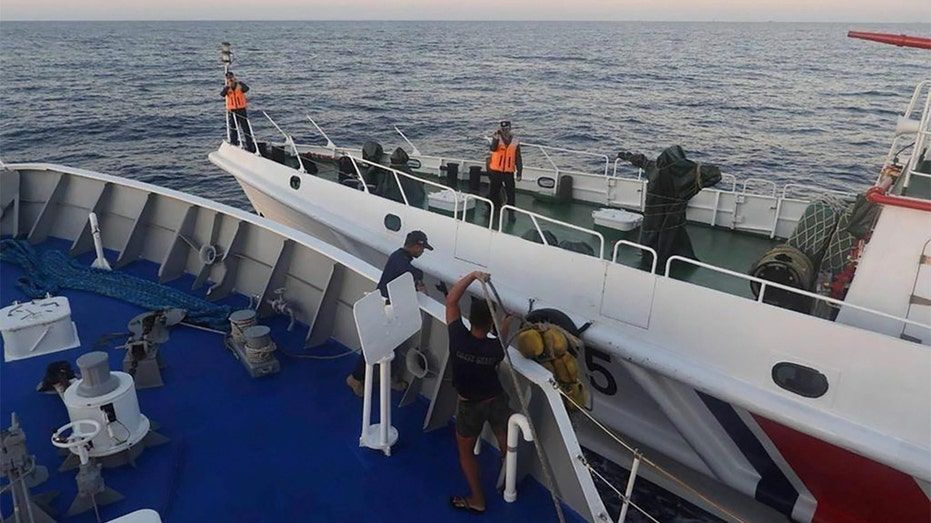Sen. Eric Schmitt, R-Mo., is calling on the Pentagon to take action in response to ongoing Chinese intimidation of the Philippines in the disputed South China Sea.
The Republican lawmaker sent Secretary Lloyd Austin a letter Tuesday underscoring his “serious concerns about the increasing volume and intensity of confrontations by the Chinese Communist Party in the South China Sea, particularly against the Philippines.”
“I request the Department of Defense to move quickly to support the Philippines in countering China’s aggressive behavior.”
Schmitt’s letter comes after a collision earlier in the day between Chinese and Filipino Coast Guard members. The Chinese Coast Guard and accompanying vessels blocked the Philippine Coast Guard and supply vessels from the disputed Second Thomas Shoal, firing water cannons and executing other dangerous maneuvers in an attempt to blockade the entrance. At least four Filipino crew members were injured.
China’s coast guard accused the Philippine ships of illegally intruding into the area’s waters and accused one of them of ramming a Chinese vessel.
SEN HAWLEY WANTS BIDEN TO HIKE TARIFFS ON CHINESE ENERGY IMPORTS
A Philippines task force said the actions by the Chinese were “another attempt to illegally impede or obstruct a routine resupply and rotation mission.”
Schmitt noted Tuesday’s confrontation followed a “string of aggressive efforts by the Chinese Communist Party to assert its unlawful territorial claims in the South China Sea.”
“The Biden Administration has upheld the Trump Administration’s position that an attack on Philippine public vessels, aircraft, and armed forces would invoke U.S. mutual defense commitments under Article IV of the 1951 U.S.-Philippine Mutual Defense Treaty,” Schmitt said. “I request the Department of Defense to provide Congress with a comprehensive plan for how the United States can help the Philippines counter such unlawful actions by the Chinese Communist Party in the South China Sea.”
Washington has strongly condemned the Chinese coast guard’s actions and its ambassador in Manila, MaryKay Carlson, said the U.S. stands with the Philippines and proponents of international law.
PHILIPPINES PRESIDENT AFFIRMS DEFENSE AGAINST CHINA IN THE SOUTH CHINA SEA TERRITORY
In Washington, U.S. State Department spokesman Matthew Miller said that the latest incidents demonstrated China’s “reckless disregard for the safety of Filipinos and also for international law,” and that China was interfering with “lawful Philippine maritime operations.”
Pentagon press secretary Maj. Gen. Patrick Ryder said China’s actions “demonstrated disregard for international law.”
“We call on the [People’s Republic of China] to abide by the international tribunal legally binding decision in 2016. The United States is going to continue to stand by our Philippine ally and our commitment to our mutual defense treaty is ironclad,” he said.
The “legally binding decision” Ryder spoke of, refers to a 2016 international tribunal that established that the waters surrounding the Second Thomas Shoal fall within the Philippines’ exclusive economic zone.
The long-simmering territorial disputes in the South China Sea are expected to be discussed at a summit of leaders of the Association of Southeast Asian Nations and their Australian counterparts on Wednesday in Melbourne.
The confrontations have sparked fears of a larger conflict that could involve the United States. The U.S. has warned it is obligated to defend the Philippines, its oldest treaty ally in Asia, if Filipino forces, ships and aircraft come under an armed attack, including in the South China Sea. China has warned the U.S. to stop meddling in what it calls a purely Asian dispute.
Brunei, Malaysia, Vietnam and Taiwan also have overlapping claims to the strategic waterway, a major global trade route which is also believed to be sitting atop rich undersea deposits of oil and gas.




